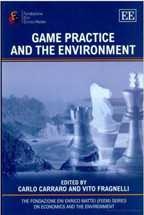Game Practice and the Environment

01.02.2004
Carlo Carraro, Vito Fragnelli
Edward Elgar, Series on Economics and the Environment
Game theory is one of the most useful mathematical tools that economists
and mathematicians have been using to deal with complex economic and
policy problems. At the same time, environmental issues are at the heart
of many domestic and international policy processes, where interactions
among different stakeholders play a crucial role. It is therefore
natural to adopt game theory as one of the analytical instruments that
can enhance our understanding of the interrelations between the economy
and the environment, and that can also provide practical suggestions for
policy interventions. This book is the outcome of an interdisciplinary
work between economists and mathematicians. Some of the chapters have
been written by mathematicians who possess sophisticated mathematical
tools and look for an interesting environmental economic problem to
apply them. Other chapters have been written by economists who look for
adequate tools to deal with relevant policy issues. All chapters of this
book improve our toolbox to deal with environmental issues and, at the
same time, provide some interesting applications and practical solutions
to relevant environmental policy problems.
Contributors: G.I. Bischi, F. Bosello, R. Branzei, B.
Buchner, C. Carraro, J.C. Ciscar, S. Currarini, S.D. Flam, V. Fragnelli,
O. Godal., H. Keiding, F. Lamantia, C. Marchiori, M. E. Marina, M.
Marini, S. Moretti, D. Raggi, L. Sbragia, A. Soria, S. H. Tijs, H.
Tulkens
Game theory is one of the most useful mathematical tools that economists and mathematicians have been using to deal with complex economic and policy problems. At the same time, environmental issues are at the heart of many domestic and international policy processes, where interactions among different stakeholders play a crucial role. It is therefore natural to adopt game theory as one of the analytical instruments that can enhance our understanding of the interrelations between the economy and the environment, and that can also provide practical suggestions for policy interventions. This book is the outcome of an interdisciplinary work between economists and mathematicians. Some of the chapters have been written by mathematicians who possess sophisticated mathematical tools and look for an interesting environmental economic problem to apply them. Other chapters have been written by economists who look for adequate tools to deal with relevant policy issues. All chapters of this book improve our toolbox to deal with environmental issues and, at the same time, provide some interesting applications and practical solutions to relevant environmental policy problems.
Contributors: G. I. Bischi, F. Bosello, R. Branzei, B. Buchner, C. Carraro, J. C. Ciscar, S. Currarini, S. D. Flam, V. Fragnelli, O. Godal., H. Keiding, F. Lamantia, C. Marchiori, M. E. Marina, M. Marini, S. Moretti, D. Raggi, L. Sbragia, A. Soria, S. H. Tijs, H. Tulkens
